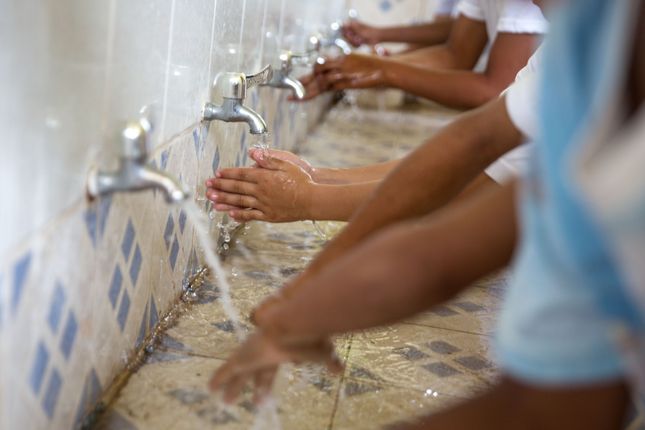
Global Program on WASH and Human Rights in Nepal and Uganda
Although water and sanitation are human rights, 2.2 billion people worldwide still don’t have access to clean drinking water. 4.2 billion people lack access to safe sanitation. Despite efforts to make these services available for everyone, the challenges remain persistent. Socio-economic inequalities, scarcity of resources, lack of sustainability, marginalization of rights holders and conflicts present only some of the reasons why so many people are still denied access to clean water.
Recent approaches such as Making Rights Real (MMR) and WASH Systems Strengthening offer promising solutions by addressing these problems and including rights holders in decision-making processes. MMR and WASH Systems Strengthening are at the center of our cross-regional WASH-program in Nepal and Uganda. The program concept was designed by Malteser International together with our partners WASH United and the German Toilet Organization (GTO). The program itself was then developed by all partners through a collaborative and iterative process on virtual multi-stakeholder platforms.
In close collaboration with four local partner organizations and the support from two members of the German WASH network, we are working to ensure that the right to water and sanitation can be fully enjoyed by everyone.
The Making Rights Real approach aims to motivate decision-makers to make WASH services accessible to everyone. The WASH Systems Strengthening approach analyzes existing gaps and develops roadmaps for improvement.
Despite some progress in some areas, billions of people worldwide continue to face challenges in accessing safe water, adequate sanitation, and proper hygiene.
Past efforts by the international community to provide infrastructure support to countries have proven unsustainable. The current trend is to help governments improve their capacity to provide sustainable services. However, this often requires overcoming financial and capacity gaps, as well as involving rights holders in decision-making processes.
In our project countries Nepal and Uganda, in which we implement our global WASH-program, the problems are very tangible.
In Nepal, access to water and sanitation is considered a constitutional right and local authorities are responsible for providing these services. Though policies and guidelines to guide WASH projects exist, most programs focus on infrastructure development rather than capacity building. Despite some improvement in the WASH sector, the main challenges are the accessibility of remote populations, improving functionality and sustainability, water quality, and increasing service levels. The reality of sanitation and hygiene in Nepal is far from the official figures. Only 25% of the basic services are reliable in comparison to the 92% of the population being officially covered.
The global program in Nepal is targeting Sarlahi and Mahottari Districts, located in Province 2 in the southern part of the country. The population there is around 5.5 million people, of which only 10.46% have access to piped water. The main source of water for most people are contaminated tube wells. The area is also disaster prone, which further affects access to water for marginalized populations.
In Uganda, the global program is implemented in Ntoroko and Bundibugyo Districts. Piped water coverage is low in both areas, with the main source being contaminated tube wells. On top of that, refugees from the DR Congo are seeking refuge in the border regions and the need for water and sanitation services continues to grow as a result.
Through our program we hope to improve access to WASH-related services in both Uganda and Nepal.
By improving access to clean water and sanitation for communities through strengthened WASH systems, we are helping people in our project regions in Nepal and Uganda to enjoy their human rights while supporting their health. Our goal: water and sanitation services are available, accessible, affordable, safe, and acceptable for everyone.
- Strengthening Governments: by building their capacity, promoting better WASH delivery methods, and sharing knowledge.
- Strengthening Civil Society Organizations (CSOs): through advocacy and raising awareness, capacity building, learning, coordination and exchanging information.
- Empowering Communities: by raising awareness, sharing information, networking, and developing their capacities.
- Enhancing Knowledge and Collaboration: by sharing information at the national and international level, awareness raising and advocacy, and capacity building.
Project data
Project regions: Nepal (Sarlahi and Mahottari Districts), Uganda (Ntoroko and Bundibugyo Districts)
Duration: 01.06.2022 - 31.05.2025
Donors: German Federal Ministry for Economic Cooperation and Development (BMZ)
Partners: RSDC (Nepal), Cafomi (Uganda), Viva con Agua Uganda (Uganda), Institute for Sustainable Futures (ISF), German Toilet Organization (GTO), WASH United








